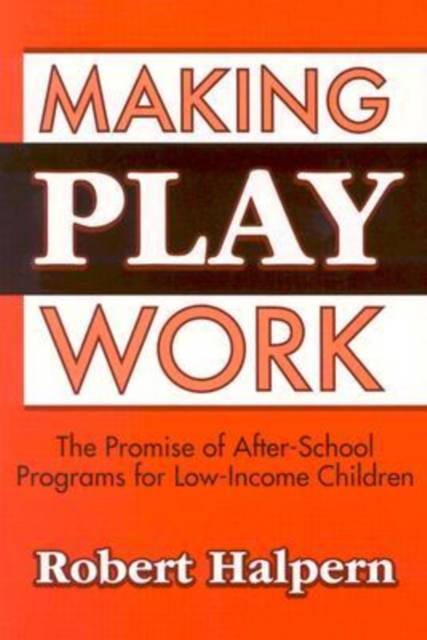
- Retrait gratuit dans votre magasin Club
- 7.000.000 titres dans notre catalogue
- Payer en toute sécurité
- Toujours un magasin près de chez vous
- Retrait gratuit dans votre magasin Club
- 7.000.0000 titres dans notre catalogue
- Payer en toute sécurité
- Toujours un magasin près de chez vous
Making Play Work
The Promise of After-School Programs for Low-Income Children
Robert Halpern
Livre broché | Anglais
28,45 €
+ 56 points
Description
After-school programs are becoming an important developmental support for low- and moderate-income children. This book describes the historical development, current status, and critical issues facing these programs. Divided into historical eras for easy reference, the text examines:
- The evolution of after-school programs and their role in the lives of children, providing a framework for reflecting on broader, contemporary issues such as the effects of poverty on children in the United States.
- The rationales for and objectives of these programs and how both were shaped by prevailing societal ideas about children.
- Patterns of sponsorship and staffing, describing daily routines and exploring the nature of children's experiences in different kinds of programs.
- The relationship between after-school programs and schools, analyzing how these programs have responded to the dilemma of balancing children's needs for guidance and supervision with their equally important need for spontaneity and self-expression.
- Current directions and expectations for the future of after-school programs.
Spécifications
Parties prenantes
- Auteur(s) :
- Editeur:
Contenu
- Nombre de pages :
- 193
- Langue:
- Anglais
Caractéristiques
- EAN:
- 9780807743690
- Date de parution :
- 01-08-03
- Format:
- Livre broché
- Format numérique:
- Trade paperback (VS)
- Dimensions :
- 162 mm x 228 mm
- Poids :
- 299 g

Les avis
Nous publions uniquement les avis qui respectent les conditions requises. Consultez nos conditions pour les avis.






